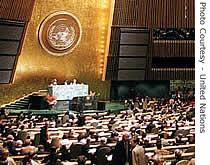-
(单词翻译:双击或拖选)
United Nations
13 September 2007
The United Nations General Assembly has adopted a non-binding declaration on the rights of native peoples, despite opposition1 from the United States and three other countries. From U.N. headquarters in New York, VOA's Margaret Besheer has more.
 |
| United Nations Assembly |
Only the United States, Canada, New Zealand and Australia - all nations with large native populations - voted against the text, expressing concerns over some provisions, including those on self-determination and rights to land and resources. Eleven nations abstained3 from the vote.
The passage of the Declaration creates no new rights and does not place indigenous people in a special category, but it does lay out their rights in a number of areas including culture, employment and language, while prohibiting discrimination against them.
Latin American delegates, like Connie Taracena from Guatemala's U.N. Mission, welcomed the Declaration, saying it will benefit their region which has a large indigenous population. "My message to the indigenous people is that this is a great opportunity to celebrate and this really opens the door for a great future."
But representatives from several indigenous groups criticized the countries that did not support the measure. Phil Fontaine, leader of the Assembly of First Nations from Canada, says his country's vote against the Declaration is a blight4 on its human rights record.
"Canada can no longer present itself as one of leading proponents5 and defenders6 and protectors of human rights. It was able to do that until this moment. You cannot pick and choose the human rights that you will defend. It is clearly a slap in the face of indigenous peoples and a huge disappointment for us," he said.
Canada objected to the measure saying it lacks clear guidance for implementation7, and conflicts with the existing Canadian Charter of Rights and Freedoms - which the government believes already protects the rights of native peoples.
Last year the General Assembly deferred8 adopting the Declaration after African countries raised objections to language on self-determination and the definition of "indigenous" people. After the language was amended9 this year, they threw their support behind it.
 收听单词发音
收听单词发音
1
opposition

|
|
| n.反对,敌对 | |
参考例句: |
|
|
|
2
indigenous

|
|
| adj.土产的,土生土长的,本地的 | |
参考例句: |
|
|
|
3
abstained

|
|
| v.戒(尤指酒),戒除( abstain的过去式和过去分词 );弃权(不投票) | |
参考例句: |
|
|
|
4
blight

|
|
| n.枯萎病;造成破坏的因素;vt.破坏,摧残 | |
参考例句: |
|
|
|
5
proponents

|
|
| n.(某事业、理论等的)支持者,拥护者( proponent的名词复数 ) | |
参考例句: |
|
|
|
6
defenders

|
|
| n.防御者( defender的名词复数 );守卫者;保护者;辩护者 | |
参考例句: |
|
|
|
7
implementation

|
|
| n.实施,贯彻 | |
参考例句: |
|
|
|
8
deferred

|
|
| adj.延期的,缓召的v.拖延,延缓,推迟( defer的过去式和过去分词 );服从某人的意愿,遵从 | |
参考例句: |
|
|
|
9
Amended

|
|
| adj. 修正的 动词amend的过去式和过去分词 | |
参考例句: |
|
|
|















